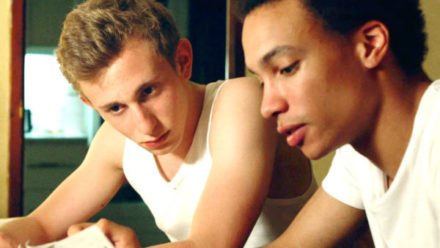 Being 17
Being 17
(Quand on a 17 ans)
Directed by André Téchiné
Written by André Téchiné and Céline Sciamma
Released February 14, 2016, at the Berlin International Film Festival
Drama/Romance (foreign)
116 min.
Review by Stephen O. Murray
March 30, 2017
I remember all too well not understanding my strong feelings when I was seventeen and not even recognizing that I was in love with my best friend…or that I was gay.
The two seventeen-year olds whose antagonism is an inchoate blocked expression of desire in André Téchiné’s Quand on a 17 ans (Being 17) have other significant stressors. Not classmates, who don’t exist except as backdrops in the movie. The dark one, Thomas (smoldering, melancholy newcomer Corentin Fila), is the adopted son of a mountain (Pyrenees) farming couple who are just getting by and whose mother’s (Mama Prossino) health problems include being pregnant (again; she has a history of miscarriages). The light one, Damien (gawky Kacey Mottet Klein), has a compassionate physician mother, Dr. Marianne Delille (Sandrine Kiberlain), who lives in fear that her husband (Alexis Loret)), a French army helicopter pilot will be killed in combat, wherever he is deployed (probably Afghanistan).
 Damien makes the first move, and is violently rebuffed. Damien’s mother decided to take Tom home while his mother is in the hospital, and the boys maintain a truce until they go off and have a fight in private in the mountains (Tom wins it). Damien has become aware that he is in love with Tom and tells him that. (“I don’t know if I’m into guys or just you,” is not greeted as good news by Tom, who has been coerced into driving Damien to a rendezvous made online but unconsummated because the man recognizes Damien is underage.) Rebuffing another advance from Damien, Tom falls and breaks his wrist, and is expelled from the Delille household.
Damien makes the first move, and is violently rebuffed. Damien’s mother decided to take Tom home while his mother is in the hospital, and the boys maintain a truce until they go off and have a fight in private in the mountains (Tom wins it). Damien has become aware that he is in love with Tom and tells him that. (“I don’t know if I’m into guys or just you,” is not greeted as good news by Tom, who has been coerced into driving Damien to a rendezvous made online but unconsummated because the man recognizes Damien is underage.) Rebuffing another advance from Damien, Tom falls and breaks his wrist, and is expelled from the Delille household.
In a Téchiné film, the viewer can be pretty sure that sexual antagonism (and simmering testosterone) will eventually lead to sex. Tom tells Damien that he was frightened by his own feelings. There is not a fairytale ending, but mutual love eventuates. And some full-frontal nudity, too.
The three leads are all superb, each playing a complicated character—and, for once, the lead was playing his actual age (rather than the too common phenomenon of a 25-year-old in the part of a 17-year-old). Being 17 recalls my favorite Téchiné film, the 1994 Les roseaux sauvages (Wild Reeds), which was also filled with adolescent longings and insecurities (not to mention homoeroticism).
©2017 by Stephen O. Murray

